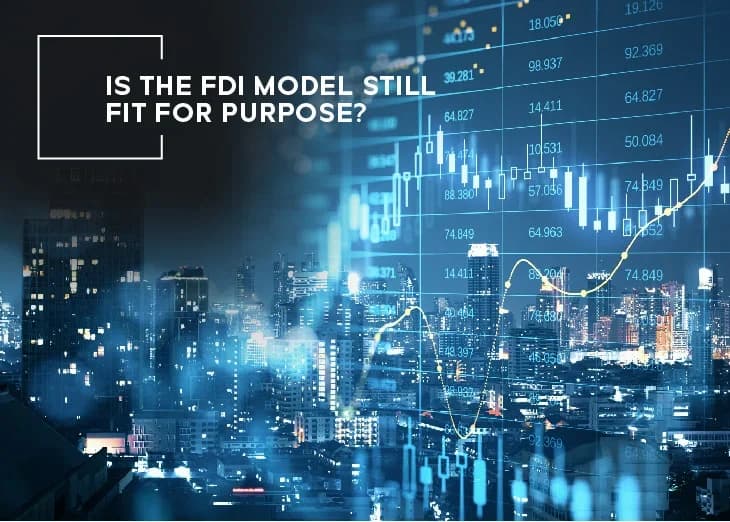It may be time to rethink – and disrupt – the entire concept of foreign direct investment and its place in the world, argues FDI consultant Douglas van den Berghe.
In its recent Investment Trends Monitor, the UN Conference on Trade and Development (UNCTAD) says that despite projections for the global economy to recover in 2021, uncertainty about the Covid-19 pandemic’s evolution and the global investment policy environment will continue to affect foreign direct investment (FDI) flows throughout the year. Some recent trends from the UNCTAD report in relation to FDI flows and greenfield FDI projects – when a company plans to invest in new production facilities in a foreign country – are:
Global FDI flows collapsed in 2020, falling 42% from $1.5trn in 2019 to an estimated $859bn, according to UNCTAD (this low level was last seen in the 1990s and is more than 30% below the investment trough that followed the 2008–09 global financial crisis).
Globally, announced greenfield projects declined by 35% in 2020 to an estimated $547bn. The decline was even steeper in developing economies, dropping 63% in Africa and 51% in Latin America and the Caribbean. Even developing economies in Asia saw a 38% drop in greenfield announcements.
Finally, global FDI will remain weak in 2021, experiencing a further decline of 5–10%.
The above downward trends in flows and greenfield FDI will impact the already heightened competition for foreign investment as even more countries will be competing for fewer projects.
Why politicians chase FDI
Attracting FDI, and in particular greenfield FDI projects, has been the ‘holy grail’ for many countries, investment promotion agencies (IPAs) and economic development organisations (EDOs). It has been sought after as a panacea and many government officials and politicians seek to cut the ribbon at the opening of a new multinational company (MNC) facility in their country, given that the project will likely create much-needed jobs. FDI as such can boost the egos (and poll ratings) of politicians. Apart from jobs and capital expenditure, FDI can create positive externalities (or spillover effects) in the form of the transfer of skills, knowledge, management expertise and R&D, while the indirect effects of FDI on an economy can be large through, for instance, more employment among suppliers servicing the new facility.
Apart from the measurement challenges associated with FDI data (i.e. does it measure what it purports to measure and how reliable is the FDI data we all use), FDI remains unquestionably a much-sought-after recipe for economic growth.
Is the FDI model broken?
The downward trends in the UNCTAD report, however, also raise concerns over how such a fall in numbers will impact our own ‘FDI industry’, as an entire advisory industry has been built around highlighting the many opportunities that FDI can bring to a location.
Why should we continue to put so many resources in attracting FDI in the first place and are there no alternatives to, in particular, greenfield FDI that may provide similar economic benefits?
Think about the international organisations involved in FDI policymaking: academia, consultants, IPAs and EDOs, national policymakers and politicians. With so many stakeholders and beneficiaries in the FDI industry we have seen many repetitive webinars during the pandemic on how to deal with these declining FDI levels. These recommendations focused on digitalising your IPA marketing and promotion activities, reprioritising your target sectors and re-examining global value chains, and looking at how your country can attract or increase its slice of the FDI cake, refocus on aftercare, expand or rely more on your IPA’s overseas network, and so on.
With so many stakeholders in this industry and the immense expectations of what FDI can mean for a country, it is doubtful whether one would dare to ask the critical fundamental question or challenge the nature of FDI: namely, why should we continue to put so many resources in attracting FDI in the first place and are there no alternatives to, in particular, greenfield FDI that may provide similar economic benefits? Is FDI always the solution for all countries? In short, most of the mentioned recommendations and tools are developed within the existing FDI model but do not challenge or question the model as such.
This article, which also appeared in Investment Monitor, was written by Dr. Douglas van den Berghe, Founder and CEO of NxtZones. NxtZones is a new Special Economic Zone (SEZ) model for future and non-performing SEZs customized to a changing global economy, industry 4.0 and based on the most innovative, sustainable, impactful and successful SEZs around the world. NxtZones is an Official Knowledge Partner of the Annual Investment Meeting.
